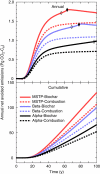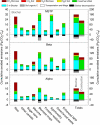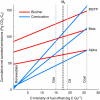Sustainable biochar to mitigate global climate change
- PMID: 20975722
- PMCID: PMC2964457
- DOI: 10.1038/ncomms1053
Sustainable biochar to mitigate global climate change
Abstract
Production of biochar (the carbon (C)-rich solid formed by pyrolysis of biomass) and its storage in soils have been suggested as a means of abating climate change by sequestering carbon, while simultaneously providing energy and increasing crop yields. Substantial uncertainties exist, however, regarding the impact, capacity and sustainability of biochar at the global level. In this paper we estimate the maximum sustainable technical potential of biochar to mitigate climate change. Annual net emissions of carbon dioxide (CO(2)), methane and nitrous oxide could be reduced by a maximum of 1.8 Pg CO(2)-C equivalent (CO(2)-C(e)) per year (12% of current anthropogenic CO(2)-C(e) emissions; 1 Pg=1 Gt), and total net emissions over the course of a century by 130 Pg CO(2)-C(e), without endangering food security, habitat or soil conservation. Biochar has a larger climate-change mitigation potential than combustion of the same sustainably procured biomass for bioenergy, except when fertile soils are amended while coal is the fuel being offset.
Conflict of interest statement
D.W., J.E.A., F.A.S.-P. and J.L. declare no competing financial interests. S.J. is Chairman of Anthroterra, a company conducting research into the development of a biochar mineral complex to replace conventional fertilizers. This company plans to manufacture and sell portable pyrolysers.
Figures







References
-
- Broecker W. S. Climate change: CO2 arithmetic. Science 315, 1371 (2007). - PubMed
-
- Matthews H. D. & Caldeira K. Stabilizing climate requires near-zero emissions. Geophys. Res. Lett. 35, L04705 (2008).
-
- Allen M. R. et al.. Warming caused by cumulative carbon emissions towards the trillionth tonne. Nature 458, 1163–1166 (2009). - PubMed
Publication types
MeSH terms
Substances
LinkOut - more resources
Full Text Sources
Medical
Miscellaneous

